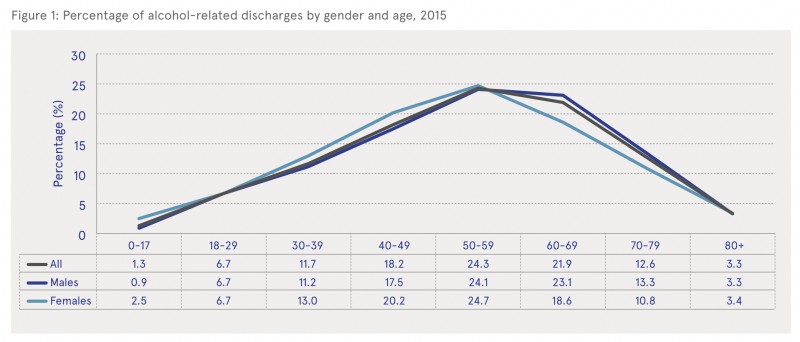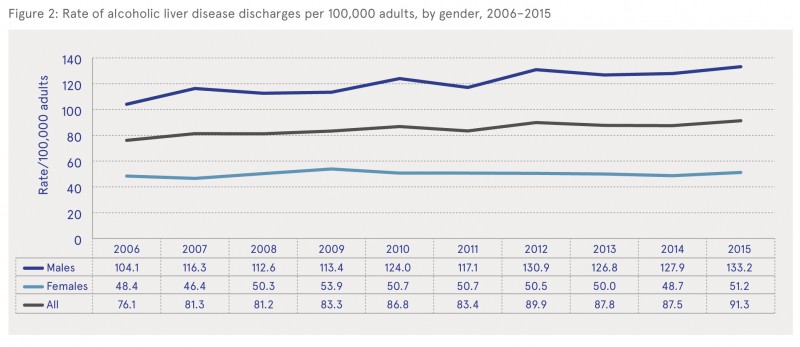Mongan, Deirdre (2017) Alcohol-related morbidity in Ireland. Drugnet ireland, Issue 62, Summer 2017, pp. 18-19.
| Preview | Title | Contact |
|---|---|---|
|
PDF (Drugnet issue 62)
700kB |
In 2016, the Health Research Board (HRB) published an overview of the situation in Ireland regarding alcohol consumption and harm and trends over time.1 This overview provided an analysis of alcohol-related discharges from 1995 to 2013 that were wholly attributable (i.e. alcohol is a necessary cause for these conditions to manifest). The data were obtained from the Hospital In-Patient Enquiry (HIPE) scheme, which collects clinical and administrative data on discharges (including deaths) from acute Irish hospitals and is managed by the Healthcare Pricing Office (HPO) in the Health Service Executive (HSE). The purpose of this article is to update this analysis for the years 2014 and 2015. A detailed description of the methods undertaken in this analysis may be found in the 2016 overview.
Number of alcohol-related discharges
The number of alcohol-related discharges increased in 2014 and 2015, with 17,917 recorded in 2015 (Table 1). The proportion of alcohol-related bed days has increased from 3.2% in 2006 to 3.8% in 2015. In 2015, alcohol-related discharges accounted for 175,750 bed days, which means that each day 482 beds were occupied by people with a wholly attributable alcohol-related condition. There has also been an increase in the mean length of stay, from 8.1 days in 2006 to 10.8 days in 2015, which suggests that patients with alcohol-related diagnoses are becoming more complex in terms of their illness.

Discharges by gender and age
In 2015, males accounted for 73.3% of discharges and females for 26.7% of discharges. In general, female discharges were younger than male discharges. While males accounted for almost three-quarters of all discharges in 2015, they only accounted for 49.2% of discharges aged less than 18 years, while females accounted for 50.8%. The age profile of discharges is presented in Figure 1. Discharges for both males and females peaked in the 50-59-years age group and 62% of all discharges were aged under 60 years.

Discharges by diagnosis
In 2015, acute conditions accounted for 10.9% of alcohol-related discharges; chronic diseases accounted for 20.7% of such discharges, while other chronic conditions accounted for 58.3% of alcohol-related discharges. Acute conditions were more prevalent among younger people, while chronic diseases and other chronic conditions were more common among older age groups. Alcoholic liver disease (ALD) was the most common chronic alcohol disease, accounting for four-fifths or 3293 of all alcohol-related chronic diseases in 2015. The rate of discharges with ALD increased from 76.1 per 100,000 adults aged 15 years and over in 2006 to 91.3 in 2015, an increase of 20.0% (Figure 2). Of all discharges with an ALD diagnosis in 2015, 8.1% died while still in hospital. The proportion of ALD discharges that died shows a similar pattern since 2006, which suggests that there has been little improvement in the prognosis of patients with ALD.

Conclusion
The number of alcohol-related discharges has increased slightly since 2013; however, the rate of discharges with a diagnosis of alcohol-related liver disease has increased by 4.1% since 2013, which is a cause of concern. Alcohol-related morbidity continues to be a public health problem, with 482 beds being occupied each day by people with a wholly attributable alcohol-related condition. Given that this does not include alcohol partially attributable discharges (alcohol must be a component cause), such as some cancers, cardiovascular disease, and intentional and unintentional injuries, the true burden is likely to be much higher. These hospital data indicate that the measures outlined in the Public Health (Alcohol) Bill 2015 need to be implemented as soon as possible.
1 Mongan D and Long J (2016) Overview of alcohol consumption, alcohol-related harm and alcohol policy in Ireland. HRB Overview Series 10. Dublin: Health Research Board. https://www.drugsandalcohol.ie/25697/
A Substance use and dependence > Effects or consequences
B Substances > Alcohol
G Health and disease > State of health
T Demographic characteristics > Adolescent / youth (teenager / young person)
T Demographic characteristics > Adult
T Demographic characteristics > Young adult
T Demographic characteristics > Gender / sex differences
VA Geographic area > Europe > Ireland
Repository Staff Only: item control page